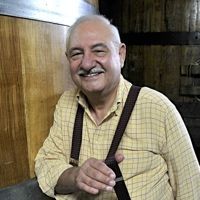Touchy touchy in Montalcino

For anyone in Montalcino fearing a dull Easter, Gianfranco Soldera of Case Basse (pictured here by Jon Wyand) had a timely surprise in the form of an exclusive interview with the Corriere della Sera, one of Italy’s most important dailies, in which he explained his departure as a member of the Consorzio of Brunello di Montalcino. The article, in the form of an interview entitled ‘why I left the Consorzio’, was so accusatory in tone that it has triggered an equally fierce reaction from the Consorzio, so much so that the Italian wine blogosphere has already dubbed the hostile exchange the ‘Brunello War’.
Soldera was news after a disgruntled cellar worker opened the taps of vats in which six vintages of Soldera’s eyewateringly expensive Brunello were ageing, the complete content of which was literally poured down the drain. The employee has since been tried and sentenced to jail, and from the very beginning the Consorzio condemned the act in the sharpest of terms while offering Soldera its support by offering wine from its producers. It would be foolish to think that the Consorzio ever expected Soldera to take up the offer, as he more than once and completely openly declared that his Brunello was the only true expression of the terroir. But it could have never imagined how this offer would backfire, as it did in the interview. Because in it Soldera accuses the Consorzio of swindling by offering him other producers' wine to be bottled under the Soldera name. He literally said he felt 'offended' by the offer, not least because his proposal to donate money for research – focusing on Brunello's DNA in order to develop a method to establish whether a wine was made exclusively from Sangiovese from Montalcino – remained unanswered.
Soldera’s accusation seems far-fetched, also because the idea of supplying wine to Soldera to compensate for his loss originally came from an Italian journalist, who suggested that wine should be bottled as 'Brunello della Solidarieta’, Brunello of solidarity, and the money from sales should be given to Soldera. Perhaps the Consorzio phrased the offer unclearly but it is easy to see it never had any malicious intention, despite Soldera's imputations, especially as the offer was made via an explicit official press release.
What may have triggered Soldera’s disproportionate reaction is the fact that he was always very vocal in his protests against any change in Brunello’s production regulations that would move away from a 100% Brunello wine and allow other grape varieties to be included. But Soldera was not the only one against the change because a large majority of the producers voted against any amendments in the regulations that could have brought this into being.
Soldera also comments in the Corriere interview that after the Brunellogate scandal, he demanded that a vote be taken to ensure that the people involved should take a back seat within the Consorzio and the region. He failed in this and instead Enzio Rivella, a staunch supporter of a change in the regulations in favour of allowing international varieties in Brunello, was voted in as the new president.
The Consorzio in the meantime has issued a press release in which it condemns the interview, and doubts Soldera’s honesty in accusing it of fraud when he had previously thanked the Consorzio for the offer (but declined). It also refutes Soldera’s claim that it is not interested in research by pointing out that it has invested €150,000 in a project carried out by the Fondazione Edmund Mach di San Michele all’Adige which looks into DNA, the study of anthocyanins to establish varietal origin and research on stable isotopes that would make it possible to trace the geographic origins of Brunello. According to the Consorzio, and confirmed by Dr Stella Grando, the head of genetics at the Istituto di San Michele all’Adige, the DNA method which Soldera insists upon is unsuitable because the results are not reproducible, thus preventing reliable control of Brunello production.
When asked by the Corriere della Sera what he thought of the four-year sentence his former employee received, Soldera said that ‘doubts remain’. According to him, the reason for the conflict was his telling the employee off for pouring water over the oak casks, which could have damaged them. To retaliate for that in such a manner, and more than three months after the incident, seems extreme to Soldera.
Become a member to view this article and thousands more!
- 15,409 featured articles
- 274,574 wine reviews
- Maps from The World Atlas of Wine, 8th edition (RRP £50)
- The Oxford Companion to Wine, 5th edition (RRP £50)
- Members’ forum
- 15,409 featured articles
- 274,574 wine reviews
- Maps from The World Atlas of Wine, 8th edition (RRP £50)
- The Oxford Companion to Wine, 5th edition (RRP £50)
- Members’ forum
- Commercial use of our Tasting Notes
